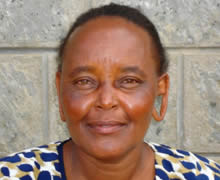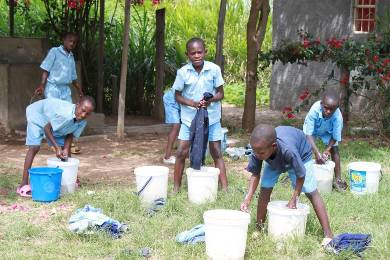
 |
|||||||
| The children in our home come in from the wider Kajiado district and come to us via the Children’s Officer, the District Commissioner or local chiefs. Most are orphans but a few come from families that cannot care for them. Agnes our matron (right) is assisted by a team of loving caring staff. Weekdays - A very important part of the children’s life at the home is education, they take this seriously. A normal weekday begins at 05.30 when the children get themselves ready for school and breakfast at 06.30. Breakfast usually consists of hot brown porridge and a slice of bread. The children have a 15 minute walk to school arriving ready to start at 07.00. |
 |
They all walk back to the home for lunch, just the older ones return to school for the afternoon, the younger ones have activities at the home. The children have to learn 3 languages, their own tribal language, and the Kenyan national language which is Swahili and English which all the major subjects are taught in. After the primary children have left for school the nursery children arrive, some from the home and others from the district that pay fees, which brings in valuable income. |
 |
 |
Sundays are for worship - this begins around 10am and is organised by Pastor Raphael and continues till around 1pm. Many of the children take part, leading singing, and prayers even giving talks. The afternoons are for games or relaxation. Occasionally an outside trip to another church fellowship is arranged and a bus from the Maasai Technical College is made available for transport.The two cooks at the home prepare and cook the meals which mainly consist of maize, beans, potatoes or rice with vegetables; many of these are grown at the home. Meat (goat or beef) is served 2 or 3 times a week. The District Commissioner and other kind people sometimes donate food, i.e. beans, maize, rice and cooking oil. High School - When children reach the required standard attend they move on to high school where they have to board during term times, returning to the Home for a few days at the end of term before going to their extended families for holidays. During these times at the home any problems the children have can be discussed and letters are written for their sponsors. Staff also visit the schools during term times monitoring the children’s welfare. |
|||